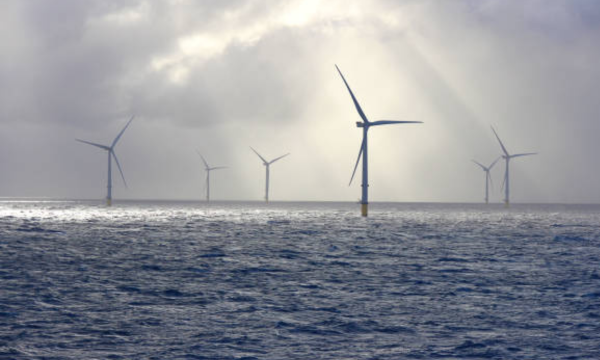Offshore Wind Energy a ‘£12bn a Year UK Investment Opportunity’

The UK is sitting on a £12 billion a year investment opportunity to develop offshore wind, with a highly skilled domestic workforce and world-class engineering capability to win wind energy development work abroad.
Speaking at the 2024 Celtic Sea FLOW (Floating Offshore Wind) summit held at the Eden Project in Cornwall, Offshore Energies UK (OEUK) director Katy Heidenreich outlined how OEUK members are building 13GW of the UK Government’s production target of 55GW of wind energy by 2030. She also spoke about the need to pull together investors and businesses with the capacity to make the energy production target a reality.
The Celtic Sea is earmarked for 4.5GW of this floating offshore wind electricity production. The conference was focused on how best to establish the network and the necessary sophisticated supply chain to transport the new energy supply to industrial and population centres elsewhere in the UK.
The vast expanses of open sea around the UK are a natural resource that puts the UK second only to China in terms of offshore wind energy capacity, says OEUK.
Much of the huge upsurge is being achieved through the new generation of super-sized floating offshore wind turbines sited up to 100 miles off the east coast of Scotland, known as the ScotWind project. Alongside them is a further project known as INTOG – Innovation and Targeted Oil and Gas – which is designed to use wind energy to power oil and gas platforms in the seas off the Scottish coast.
Katy Heidenreich said:
“There will be a lot more offshore wind capacity towards the end of the decade and into the next, some of this driven by licences in the Celtic Sea, which will offer a huge economic boost to Wales and the south west of England.
“We have an energy supply chain with over 50 years of expertise in delivering large scale oil and gas capital projects, and a workforce that will be vital to delivering our ambitious offshore wind programme across the whole of the UK.
“This upcoming wave of new energy investments is a strategic opportunity for the oil and gas supply chain to diversify its revenue streams, enhance its capabilities, and extend its reach into international markets. However, none of this is a given. All requires huge investment – by 2030, an average £12 billion per year will be needed.
“Industry and government must come together to build a detailed investment plan to scale up the UK supply chain and make it competitive while benefitting the regions. An industrial strategy across the energy sector is needed to deliver 2030 net zero power and 2050 net zero and provide sustainable growth for UK plc.”
Related
Why investing in women is a vital next step for…
Get Nadine White's Race Report newsletter for a fresh perspective on the week's newsGet our free newsletter from The Independent's Race CorrespondentGet our fre
Business secretary signals major shift on electric car policy to…
In a determined effort to retain Nissan’s manufacturing presence in Britain, Business Secretary Jonathan Reynolds has vowed to implement “substantial c
Joint Statement: Business Secretary and Fujitsu Services Ltd
Business and Trade Secretary Jonathan Reynolds today (Friday 7 March) met chiefs for Fujitsu in Tokyo to begin talks over the cost of redress for victims of th
UK foreign secretary backs multilateral defence funding for Europe
UK foreign secretary David Lammy has said that a new multilateral fund will be needed to secure Europe’s defence as he confirmed that Britain is “open to”













